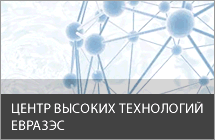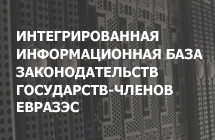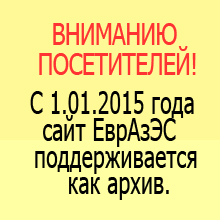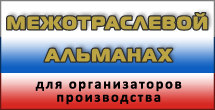|
fundamentals of Energy Policy of the Eurasian Economic Community Member States APPROVED by Resolution of the EurAsEC Interstate Council 28 February 2003, No. 103
fundamentals of Energy Policy of the Eurasian Economic Community Member States
The energy policy fundamentals of Eurasian Economic Community member states (hereinafter EurAsEC member states) represent a system of concepts officially adopted in these states with regard to goals, objectives, guidelines, basic trends, and arrangements for implementation of EurAsEC member states’ energy policy.
1. general provisions
The energy policy of EurAsEC member states implies their joint activity to rationally use energy resources and create a common complementary fuel and energy complex of the parties to EurAsEC. This policy is based on improving efficient functioning of energy systems, developing the transit potential of EurAsEC member states and creating favorable conditions for an increase in energy resource supplies between the states. It is directed at ensuring energy independence of EurAsEC member states by the reactivation and development of mutually beneficial economic ties in the energy sector and establishing a common energy market. EurAsEC member states’ energy policy is formulated based on their constitutions, laws and other legal and regulatory documents, international treaties which they are parties to, resolutions by integration management organs within EurAsEC, and consistently applied principles and international rules. A subject of the energy policy is the fuel and energy complexes of EurAsEC member states. Participants of the energy policy are integration management organs within EurAsEC, government authorities, official energy management bodies, international energy institutions, and public associations. A goal of the energy policy of EurAsEC member states is to ensure energy independence and energy security of Community countries by establishing a common energy resources market and a reliable base for stable economic growth. Energy independence means endowment of EurAsEC member states with local energy resources based on market demands, as well as the potential for usage and/or reservation of alternative sources to import fuel and energy. Energy security means the security of the EurAsEC member states’ energy sector against internal and external conditions, processes and factors posing a threat to its stable development and energy independence.
Major objectives of EurAsEC member states’ energy policy: development of mutually beneficial cooperation in the energy sector and joint efforts to establish the common energy market; saturation of the internal market with energy resources and increase of their export to third countries; establishing a wholesale market of electric energy and power; rational usage of water, fuel and energy resources; extension of cooperation in developing new fields of hydrocarbon raw material, its processing and transportation for export; development of transit potential; ensuring energy security and creating conditions for stable economic growth.
Principles of EurAsEC member states’ energy policy: mutual respect for sovereignty and national interests; comprehensive cooperation in establishing a common complementary fuel and energy complex; cross liability for undertaking measures to secure national interests in the development of the energy sector, taking account of the energy security interests of EurAsEC member states; recognition of the priority of joint resolutions in the area of energy security.
2. basic trends in THE energy policy of EurAsEC member states
2.1. Ensuring the energy security of EurAsEC member states. Ensuring the energy security of EurAsEC member states implies: – unification of laws in the energy sector and creating a legal base to establish the energy market; – meeting internal market demands for energy resources and developing the export potential of EurAsEC member states; – formulation of agreed guidelines for customs, tax and pricing policies of EurAsEC member states in the energy sector. 2.2. Establishing a common energy market of EurAsEC member states. Establishing a common energy market of EurAsEC member states implies: – enhancing interaction between energy systems of EurAsEC member states and providing for the potential of interstate energy transfers under conditions of the functioning common energy and power market; – making power grids available for transit of the electric power of EurAsEC member states subject to the same favorable conditions as the transmission of their own electric power by these grids and based on mutually advantageous parallel operation of energy systems; – creating conditions for rational usage of water energy resources and electric power; – rendering mutual assistance for elimination of the consequences of natural disasters and emergencies at electric power facilities; – enhancing the efficiency of existing generating capacities and constructing new ones for the purpose of ensuring energy security and satisfying the demands of EurAsEC member states for cheap electric power; – establishing joint ventures for the generation, transmission and transit of electric power, and the production of electric power equipment; – carrying out joint scientific research for developing the electric power complexes of EurAsEC member states. 2.3. Establishing a common oil and gas market of EurAsEC member states. Establishing a common oil and gas market of EurAsEC member states implies: – creating conditions to enhance the efficiency of joint geological and exploration operations; – joint development of new oil and gas fields; – undertaking agreed measures to upgrade and reconstruct gas supply systems; – pursuing the agreed policy to provide oil refineries of EurAsEC countries with oil resources; – establishing joint oil and gas processing ventures; – developing mutually beneficial cooperation between EurAsEC member states to construct new transport systems and reconstruct the existing ones that are intended for optimization and enhancement of oil and gas export flows of the Five Countries; – formulation of unified regulations for access to main oil and gas pipeline systems of EurAsEC member states and ensuring transit of oil and gas resources within the Community countries; – developing optimum oil and gas transport routes; – creating conditions for rational oil and gas usage; – pursuing agreed policy to expand the oil and gas sales markets; – establishing joint ventures for production of oil and gas equipment. 2.4. Establishing a common coal market of EurAsEC member states. Establishing a common coal market of EurAsEC member states implies: – joint development of prospective coal fields and establishing joint coal mining and coal washing ventures; – developing trade and economic cooperation between EurAsEC countries, providing for increase in interstate coal supplies by optimization of railway rates for internal and external coal transportation; – preservation of existing coal sales markets and establishing new ones; – improving the quality of coal products, developing coal washing and carrying out joint scientific research; – undertaking measures for the reconstruction and technical upgrading of coal mining enterprises; – establishing joint ventures for the production of mining equipment.
3. implementation of energy policy of EurAsEC member states
The provisions of these Energy Policy Fundamentals of EurAsEC Member states are implemented by means of coordinated activities by participants of the Community countries’ energy policy in compliance with their national legislations by preparing a Program for Developing Fuel and Energy Complexes in EurAsEC Member states. A preliminary stage of preparing this Program includes joint development by the Parties of a Concept for Establishing a Common Energy Market of EurAsEC Member states. The Energy Policy Council at the EurAsEC Integration Committee (hereinafter the Council) is an organ of EurAsEC member states which is responsible for pursuing the agreed policy in the energy sector, and for coordinating activities by energy departments to establish the Community countries’ common energy market. For implementation of particular directions of the EurAsEC member states’ energy policy, the Council establishes commissions and task groups. Financial support for implementation of EurAsEC member states’ energy policy is carried out within funds provided for these purposes in national budgets as well as from extra-budgetary sources, use of which is defined as duly established by national legislations of EurAsEC member states. Logistical support for state executive authorities that participate in undertaking agreed measures of the EurAsEC member states’ energy policy is carried out within the scope annually defined in national budgets of EurAsEC member states. The Energy Policy Fundamentals of EurAsEC Member states can be amended, clarified and improved as their integration in the power sector increases. __________
|
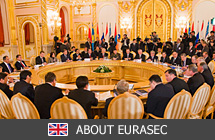
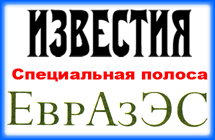
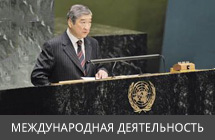
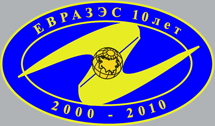
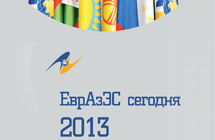
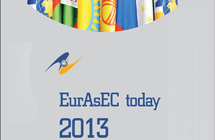
Поиск 10.10.2014 Заседание Межгосударственного совета ЕврАзЭС07.10.2014 Мультимедийная пресс-конференция в агентстве «Россия сегодня»03.10.2014 Встреча с Послом Финляндской Республики04.08.2014 Встреча Генерального секретаря ЕврАзЭС с Послом Республики Таджикистан20.06.2014 Премии Петербургского международного юридического форума «За вклад в развитие правовой интеграции на евразийском пространстве»28.05.2014 Договор о Евразийском экономическом союзе – важнейшее событие в новейшей истории наших стран25.05.2014 Презентация книги «Евразийский проект Нурсултана Назарбаева, воплощенный в жизнь. К 20-летию евразийского проекта 1994–2014»24.05.2014 VII АСТАНИНСКИЙ ЭКОНОМИЧЕСКИЙ ФОРУМ. Панельная сессия «Евразийской экономической интеграции – 20 лет. Итоги и перспективы»24.05.2014 VII Астанинский экономический форум и II Всемирная Антикризисная конференция, 21-23 мая 2014 года, Астана24.05.2014 Петербургский международный экономический форум, 23 – 24 мая 2014 года, Санкт-Петербург |

Евразийское экономическое сообщество
ЕврАзЭС
-
Страны участники
 Беларусь
Беларусь
-
 Казахстан
Казахстан
-
 Кыргызстан
Кыргызстан
-
 Россия
Россия
-
 Таджикистан
Таджикистан
-
 Узбекистан
Узбекистан
-
 Молдова
Молдова
-
 Украина
Украина

